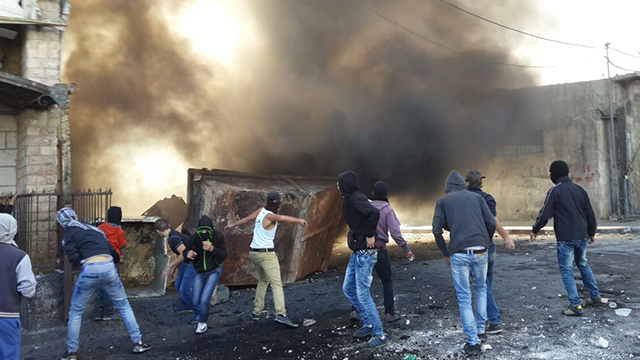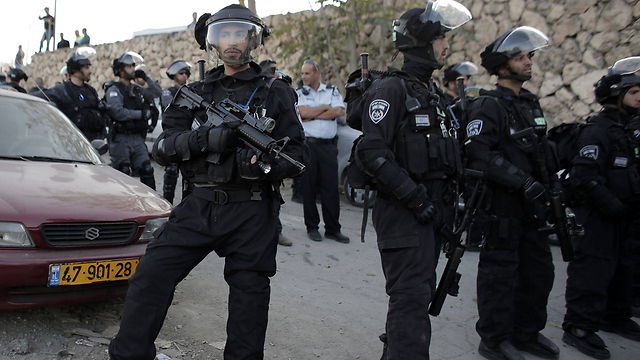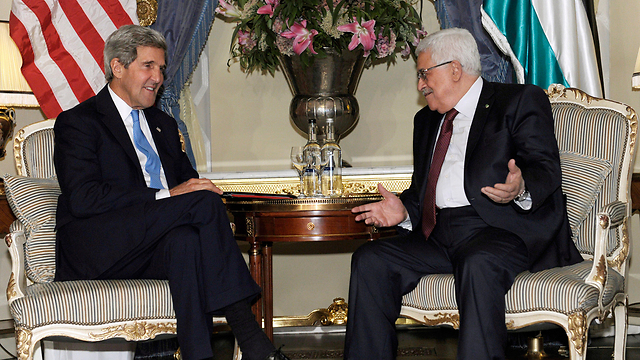US Sec of state will meet separately with Abbas to discuss ways to end incitement to Jerusalem violence.
Abbas spokesman: ‘The Israeli violations are a red line & cannot be tolerated.’
By AFP & Reuters
Prime Minister Benjamin Netanyahu, US Secretary of State John Kerry and Jordan’s King Abdullah II will meet Thursday to discuss rising tensions in Jerusalem, particularly at the flashpoint Al-Aqsa mosque compound, the US State Department said.

Clashes in East Jerusalem – Photo: Mohammed Shinawi
Kerry was also set to meet separately with Palestinian President Mahmoud Abbas on Thursday in an attempt to ease a surge of violence across Israel and Palestinian territories.
Ahead of the top US diplomat’s meetings in Amman for talks focused on rising tensions in East Jerusalem, police clashed with Palestinian demonstrators in the city’s Issawiya neighborhood and other locales.
Around 100 residents, among them schoolchildren, tried to block the main road in protest after police blocked off several of Issawiya’s entrances with concrete blocks. Police fired tear gas, percussion bombs and rubber bullets to break up the rally.
Months of unrest have escalated in recent days, spreading from East Jerusalem to the West Bank and Arab communities across Israel, and raising fears of a new Palestinian uprising.
‘Red line’
The meeting between Abbas and Kerry, who arrived in Jordan late on Wednesday, comes a day after Israel approved plans for another 200 settler homes in a neighborhood of East Jerusalem, a move sharply criticized by Washington.

Police gathered at the entrance to the Issawiya neighborhood in Jerusalem. – Photo: AFP
Much of the unrest in Jerusalem has been fuelled by religious tensions at the Al-Aqsa mosque compound, a site holy to both Muslims and Jews.
The Palestinians have been deeply angered by a campaign by far-right Jewish fringe groups to secure prayer rights at the shrine, although Israel has repeatedly stressed it has no plans to change the decades old status quo, under which Jews can visit but not pray there.
Abbas’s spokesman said he would tell Kerry of the Palestinians’ growing concerns over Israel’s actions, particularly in Jerusalem.
“The Palestinian position will be made crystal clear: the Israeli violations are a red line and cannot be tolerated – especially with the tension and Israeli escalation in Al-Aqsa and Jerusalem,” Nabil Abu Rudeina told AFP.
‘End provocative acts’
In a letter to the UN Security Council sent on Wednesday, Palestinian ambassador Riyad Mansour demanded international intervention.

Kerry and Abbas meeting in 2013 – Photo: AP
“The flagrant disrespect for this holy site and for Palestinian worshippers, marked by daily incursions into the compound… must be taken seriously by the international community as they are stoking religious sensitivities and aggravating tensions, with the potential to spiral out of control,” he said.
Clashes at the mosque compound have drawn sharp criticism from both the Palestinians and Jordan, which has custodial rights at the shrine.
Ahead of Kerry’s arrival, King Abdullah met Abbas in Amman for talks in which he expressed his “total rejection” of Israel’s “repeated aggressions and provocations in Jerusalem,” a palace statement said.
In a move likely to further heighten tensions around the compound, Public Security Minister Yitzhak Aharonovitch said late Wednesday he would introduce metal detectors and facial-recognition technology at the entrances.
“We’ll increase the supervision of people entering the compound, both Jews and Muslims,” he said. Metal detectors were removed from the compound’s gates in 2000.
The US State Department sharply condemned Israel’s announcement of 200 new homes in the East Jerusalem neighborhood of Ramot.
“We are deeply concerned by this decision, particularly given the tense situation in Jerusalem,” said spokeswoman Jen Psaki.
Middle East Quartet envoy Tony Blair urged Israeli and Palestinian leaders to call for restraint and “an end to hostile and provocative acts”, including settlement construction.
UN chief Ban Ki-moon demanded both sides do everything possible “to avoid further exacerbating an already tense environment”.
View original Ynet publication at: http://www.ynetnews.com/articles/0,7340,L-4591757,00.html






 Israeli New Shekel Exchange Rate
Israeli New Shekel Exchange Rate